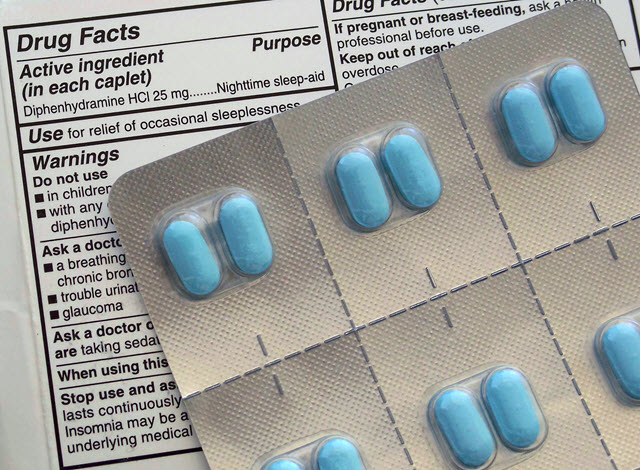Over-the-Counter Sleep Aids
Antihistamines and Non-prescription Drugs for Insomnia
In the battle against insomnia various types of medications are available, including prescription sleep aids and over-the-counter (OTC) antihistamines and sleep aids. OTC medications are popular for their availability, cost, and ease in use.
In the last decade prescription sleep aids like Ambien, Lunesta and Sonata have risen in popularity and are widely prescribed by doctors for short-term use. But in order to get these drugs you must be willing to go to the doctor and pay the price for prescription drugs. And these types of drugs are powerful and could have a battery of side effects. But for temporary sleep disturbances or transient insomnia, a common solution is found right in your local drugstore.
Antihistamines as Sleep Aids
Antihistamines, the stuff you take for treating sinus congestion, the common cold, and allergies, also make convenient solutions for temporary insomnia. Products with brandnames like Benadryl and Genahist, include the active ingredient diphenhydramine, an antihistamine that also induces sleep. Other OTC’s designed to induce drowsiness include: Tylenol PM and Excedrin PM.
Active Ingredient Diphenhydramine

The active ingredient in most OTC antihistamine products is diphenhydramine. When the drug was developed in the mid 1940s it was designed to effectively reduce inflammation from histamines. Serendipitously the drug was also discovered to limit serotonin reuptake, which is the mechanism of most modern anti-depressants. It is just this mechanism that helps make diphenhydramine a useful hypnotic or sleep aid.
OTC Sleep Aids
Non-prescription medications actually designed to help you fall asleep are also widely available and most list diphenhydramine as their main ingredient. Again, for short-term or non-chronic insomnia symptoms they are handy to get your hands on and you may even have them stashed in a bathroom medicine cabinet:
- Unisom
- Sominex
Side Effects of Diphenhydramine
Almost every type of drug including natural supplements has a list of possible side effects. Despite its common usage, even diphenhydramine has risks associated with use:
- drowsiness, which makes it a natural solution for insomnia sufferers
- nausea
- loss of concentration
- irritability
- dry mouth
- rapid heartbeat
Any adverse side effects associated with an OTC antihistamine or sleep aid should be immediately reported to your physician and you should stop taking the drug. Chronic insomnia should not be treated long term with over the counter products. Talk to your doctor if you experience regular problems sleeping.
